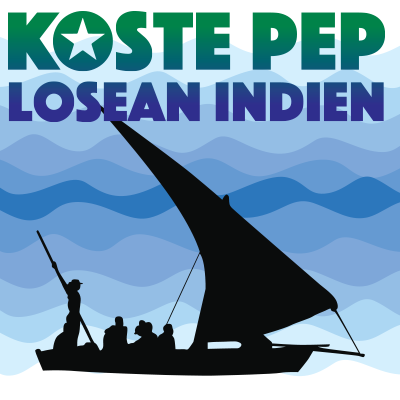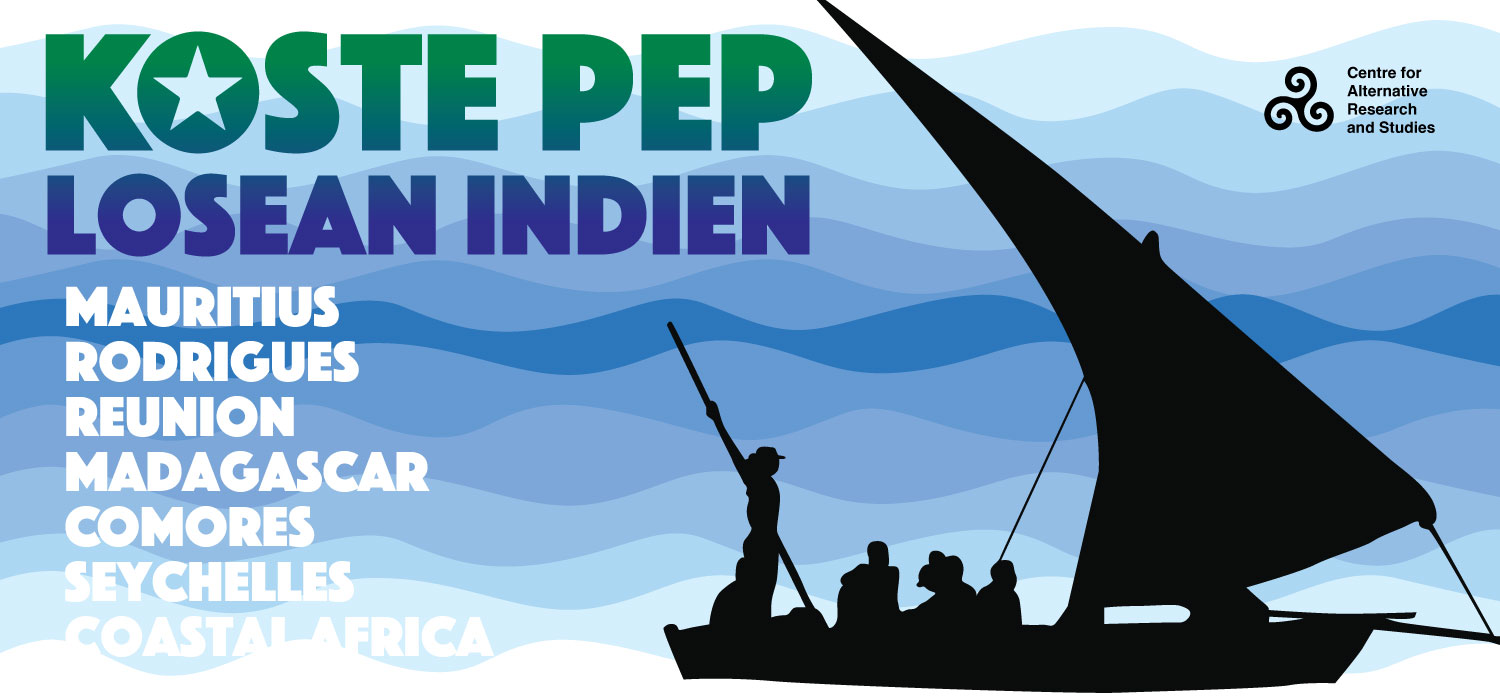Notes for a
Call for a movement of the peoples of the Indian Ocean
Koste Pep Losean Indyen
The Indian-Ocean meeting, held from 30 to 31 October 2018 in Mauritius, organized by CARES, as part of the School of Ecology 2018, bringing together movements and activists from the Indian-Ocean / coastal regions of Mauritius. Southern Africa, including social movements, trade unions, workers, women, fishers, youth and environmental movements as well as academics, artists, islanders, nature lovers from region:
Realizing our commonalities:
- Our specific geographical location, shaping us not only as land people but as ocean people;
- Our harsh common history of colonialism and slavery; and the consequent resistance and liberation processes of our peoples and our ancestors;
- Our current common threats resulting from the climate and ecological crisis;
- Our common needs to make our voices heard and shape policies for a common future, in order to transcend our harsh past and the threats to our survival;
Acknowledging the unprecedented geological period in which we find ourselves, the Anthropocene, and the critical crossing of planetary ecological boundaries, threatening the basis of civilization and human lives; and the reproductive cycle of certain other life forms on the planet;
Understanding that the deep climate and ecological crisis is the direct product of the social, economic and political system – capitalism, patriarchy, racialized – based on the permanent accumulation of wealth for the few, the dispossession and capture of nature, the extraction-exploitation of human labor and the expropriation of our common natural wealth;
Understanding that the climatic and ecological crisis will mainly affect the populations of the South, Africa, the oceans and in particular the Indian Ocean and its inhabitants;
Conscious of the fact that the Indian Ocean and the peoples of the coastal regions of Africa, while facing the vestiges of colonial domination and past imperialism, remain deprived of social, economic, cultural rights as well as sovereign rights ‘
Concerned that we are currently living under the reality of the impact of the climate and ecological crisis, we now face a new form of the colonial period characterized by the grabbing of livelihoods and our common natural wealth of a part, generating a process of deep gentrification in our societies;
Concerned by the fascistic emergence of climate skeptics in many parts of the globe, threatening not only the civil rights of citizens, but also the very foundations of human survival with climate/ecological crises and global nuclear war.
After discussing the following critical issues:
- The growing impact of the climate and ecological crisis on the Indian Ocean and its peoples;
• Looting, capturing, monopolizing and extractivism of the common heritage of our oceans and its wealth;
• Social and political rights;
• Growing ocean militarism;
• The remaining decolonization processes, while creating challenges to deal with new imperial powers;
• The failure of existing institutional power, economic and social systems at global, regional and local levels to protect the ocean and its inhabitants; and the need to develop people’s power.
Ask the peoples of the Indian Ocean to be in motion to say that:
1) Life matters on our planet! 1.5c is the limit;
2) The system must change;
3) Ecological, social and economic transition, challenging the global, regional and local power structure is a necessity for survival;
4) Indian Ocean States should recognize the current climate and ecological emergency, as well as the right of peoples to life and the right of nature in our Constitutions. All economic development must conform to these fundamental constitutional changes;
5) A significant change towards renewable energies based on energy democracy and imperatively articulated with social rights and the participation of citizens in production;
6) The principle of climate debt, climate justice, carbon budget must be recognized and be fundamental to tackling the climate crisis;
7) Countries and companies, mainly in the north, have to pay! They have already profited from colonialism and slavery; and now responsible for the climate crisis through their past and present carbon emissions. They must pay their climate and ecological debt to the populations of the Indian Ocean and the South, to ensure our strategy of socio-ecological transition and adaptation.
8) Countries and societies should leave the oil in the ground as well as the coal underground and adopt a fundamental socio-ecological transformation, for the survival of the peoples of the Indian Ocean and those of their own country, rich and industrialized;
9) Common actions of the Peoples of the Oceans who rise together with people and youth on the move in the world against all States and societies that threaten the survival of human societies and the planetary ecosystem;
10) Our ocean is our common good. Stop plundering our ocean. Stop all fishing or resource extraction agreements that are harmful to our people, our food sovereignty and the biodiversity of our oceans;
11) We want peace! The Indian Ocean must be declared a zone of peace. All foreign military bases, like Diego Garcia, must be closed,
12) No to the remains of colonization. Our process of decolonization must be completed. All territories detached and now occupied by the colonial powers must be returned to the people of the respective countries.
13) No to all new forms of colonization or grabbing of land, islands, coasts, beaches, oceans.
14) Support the rights of all island people to fight for more freedom and their right to self-determination.
Calling on the peoples to create alternative visions to reorganize society in order to ensure the conditions for the reproduction of all forms of life and the well-being of the populations of our region and the planet.
- With the full participation of workers, women, youth as well as small farmers and producers linked to the land and the ocean, fishermen and all citizens in love with life as the backbone of such a movement of ocean peoples in opposition to the capitalist and false solution promoted by global institutions and elites.
- Be firmly grounded in eco-socialism, eco-feminism and horizontal ruling democracy
- Rethink our relationship to nature, collectively as a society and individually in our way of life.
- Promote the concept of the rights of nature, the commons, in conjunction with all social, economic and cultural rights in our national, regional and global systems, and in opposition to the corporate system and its so-called “rights” promote by the WTO and global and/or regional bodies
- Challenge current food systems to guarantee food sovereignty and the security of our populations
- Challenge current corporate technological control that undermines peoples’ rights and civil liberties.
Drafted by CARES and presented for discussion at the preliminary meeting on January 29, 2020. Mauritius.


